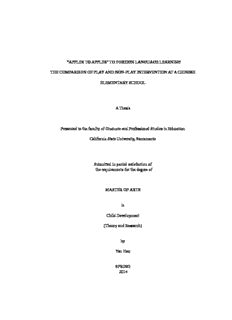Table Of Content“APPLES TO APPLES” TO FOREIGN LANGUAGE LEARNING
THE COMPARISON OF PLAY AND NON-PLAY INTERVENTION AT A CHINESE
ELEMENTARY SCHOOL
A Thesis
Presented to the faculty of Graduate and Professional Studies in Education
California State University, Sacramento
Submitted in partial satisfaction of
the requirements for the degree of
MASTER OF ARTS
in
Child Development
(Theory and Research)
by
Yan Hao
SPRING
2014
© 2014
Yan Hao
ALL RIGHTS RESERVED
ii
“APPLES TO APPLES” TO FOREIGN LANGUAGE LEARNING
THE COMPARISON OF PLAY AND NON-PLAY INTERVENTION AT A CHINESE
ELEMENTARY SCHOOL
A Thesis
by
Yan Hao
Approved by:
__________________________________, Committee Chair
Dr. Juliana Raskauskas
__________________________________, Second Reader
Dr. Li-Ling Sun
____________________________
Date
iii
Student: Yan Hao
I certify that this student has met the requirements for format contained in the University format
manual, and that this thesis is suitable for shelving in the Library and credit is to be awarded for
the thesis.
__________________________, Department Chair ___________________
Dr. Susan Heredia Date
Department of Graduate and Professional Studies in Education
iv
Abstract
of
“APPLES TO APPLES” TO FOREIGN LANGUAGE LEARNING
THE COMPARISON OF PLAY AND NON-PLAY INTERVENTION AT A CHINESE
ELEMENTARY SCHOOL
by
Yan Hao
The aim of the present study was to investigate the English learning and motivation of
elementary school children participating in a play intervention using the “Apples to
Apples” game. Thirty-six children participated in the study, 18 participated in the play
intervention group and 18 participated in a comparison group. A quasi-experimental
design was used with pre and post data collection over a one month period. The results
suggest that children participating in the play intervention showed a significant increase
in English test scores and in their motivation for language learning over the one month
period. This study supports the use of play-based interventions in improving children’s
language and motivation in foreign language learning.
_______________________, Committee Chair
Dr. Juliana Raskauskas
______________________
Date
v
DEDICATION
To my parents
vi
ACKNOWLEDGEMENTS
First and foremost, I would like to express my appreciation and gratitude to my advisor,
Dr. Juliana Raskauskas, for her encouragement and support. She has provided her quality
time and immense patience to help me with my writing. Without her guidance, this thesis
could not have been completed.
I would like to thank my second reader Dr. Li-Ling Sun for teaching me how to do good
research and giving me lots of valuable suggestions.
I am very grateful to Dr. Lynda Stone, over the past three years I have received lots of
support and encouragement from her. Her encouragement has made this a thoughtful and
rewarding journey.
I also thank Dr. Sheri E. Hembree, without her understanding and help, I could not
complete this thesis this year.
I am truly grateful to Jessamyn Carino, thank you for listening to me and encouraging me
keep going these years. And thanks for being my friend.
I would like to thank my parents, Mr. Jianan Hao and Mrs. Aiping Jin for their support
and encouragement. They have been always there for me and believing in me throughout
these years.
Lastly but certainly not the least, I would like to thank my husband, Buyue Qian. Without
his love and support, I would not have been able to pursue my dream here. Also thank to
my son, Daniel Qian, you are my angel. I love you.
vii
TABLE OF CONTENTS
Page
Dedication ............................................................................................................................... vi
Acknowledgements ............................................................................................................... vii
List of Tables ............................................................................................................................ x
List of Figures ......................................................................................................................... xi
Chapter
1. INTRODUCTION ……………………………………………………………………. 1
Statement of the Problem ........................................................................................ .. 1
Purpose and Significance of the Study ......................................................................... 3
Methods ...................................................................................................................... 7
Definition of Terms ..................................................................................................... 9
Limitations of the Study ............................................................................................ 11
Organization of the Study ......................................................................................... 12
2. LITERATURE REVIEW .............................................................................................. 14
Theoretical Framework for Play and Learning ......................................................... 15
Play and Language Learning .................................................................................... 23
Motivation and Learning .......................................................................................... 32
Present Study ............................................................................................................ 35
3. METHODS ................................................................................................................... 38
Research Design ....................................................................................................... 38
Participants................................................................................................................ 38
viii
Data Sources and Instruments ................................................................................... 39
Procedures ................................................................................................................. 42
Analytical Methods ................................................................................................... 43
4. RESULTS...................................................................................................................... 44
5. DISCUSSIONS ............................................................................................................. 49
Limitation of the Study and Future Research ........................................................... 53
Implications .............................................................................................................. 58
Appendix A. Demographic Survey for Children ............................................................ 59
Appendix B. English Language Learner Motivation Scales (ELLMS): Pre-College ....... 60
Appendix C. Cambridge Young Learners’ English Tests .................................................. 63
References .............................................................................................................................. 75
ix
LIST OF TABLES
Tables Page
1. Descriptive Statistics and T- test Results for English Performance (YEL Score) and
Motivation (ELLMS Score) in Play Intervention Group .……………………………45
2. Descriptive Statistics and T- test Results for YEL Score and ELLMS Score in
Non-Play Comparison Group .................................. .………………………………. 46
3. T-test Comparing Play Intervention Group and Non-Play Comparison Group on
Post YEL English Test Score and ELLMS Test Score .. .…………………………… 47
x
Description:the importance of the relationship between play and language acquisition. According to. Vygotsky (1976 alternate reality game could improve students' motivation of learning a foreign language. Motivation and Learning. Apples to Apples is a language arts word game. Each player has seven red

